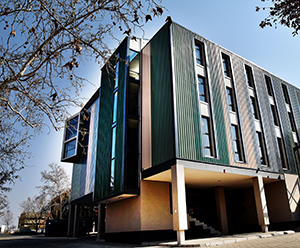Latest News Archive
Please select Category, Year, and then Month to display items
09 March 2022
|
Story Dr Cornelius Hagenmeier
 Internationalisation professionals attending the Dialogue on Innovative Higher Education Strategies National Multiplication Training workshop at the UFS.
Internationalisation professionals attending the Dialogue on Innovative Higher Education Strategies National Multiplication Training workshop at the UFS.
Dr Segun Obadire (Univen) and
Dr Cornelius Hagenmeier (UFS), who serve as directors responsible for the international offices at their universities, are part of the training committee. The theme of the training programme is ‘Enabling Internationalisation in Light of the 2020 Policy Framework for Internationalisation of Higher Education in South Africa 2022’; it comprises two training workshops and several virtual engagements. The first training workshop was held at the UFS from 1 to 3 March 2022.
Trendsetters
Mrs Nontlanhla Ntakana and Mr Matome Mokoena are alumni of the biannual DAAD DIES Training Course on Management of Internationalisation (MOI) at the
Leibniz University Hannover in Germany. They seized the opportunity to forge a multiplication training that would impact internationalisation leaders and managers from across South Africa and empower them to leverage the 2020 Policy Framework for Internationalisation of Higher Education in South Africa to advance the internationalisation process at their institutions.
Internationalisation experts
Dr Nico Jooste and Mrs Merle Hodges served as external experts on the training committee. Both are internationally renowned experts in the field and former presidents of the
International Education Association of South Africa (IEASA). Mr Leolyn Jackson (Central University of Technology, CUT) and Prof Lynette Jacobs (UFS) also contributed to the first training workshop.
Structure
This programme commenced in February, with participants engaging in topical readings and submitting their first assignment. First, a virtual workshop introduced participants to the UNIVEN Moodle e-learning platform used for the course. The face-to-face workshop at the UFS will be followed by a second in-person training at the University of Venda in September 2022. Virtual workshops and support of the participants through a dedicated WhatsApp group and other mentorship programmes will ensure the continuity of the training between the face-to-face workshops. Participants who were unable to attend the UFS and UNIVEN workshops in person could participate via a virtual link, thus ensuring that no participant is left behind.
Participants
Twenty participants from eight public higher education institutions were selected by the training committee to participate in the training programme. Two participants from this year’s NMT cohort were also accepted into the DIES MOI course at the Leibniz University Hannover in Germany. They are
Prof Nontokozo Mashiya from the University of Zululand (Unizulu) and Mbali Mkhize from the
Mangosuthu University of Technology (MUT). Participants in the first workshop have indicated that they gained a lot from the numerous exercises and activities in the programme. They also mentioned that the programme would change the outlook of internationalisation at their universities in the future.
Expansion to Physics building officially opened on Bloemfontein Campus
2016-05-06

The newly-opened addition to the Physics Building on the Bloemfontein Campus.
Photo: Charl Devenish
|
An extension to the Department of Physics at the University of the Free State (UFS) was officially opened on the Bloemfontein Campus on 20 April 2016.
“This started off about five years ago when we were talking about not having enough room for large classes. Prof Matie Hoffman suggested that we build a large lecture room on our parking space,” said Prof Hendrik Swart, Professor in the Department of Physics as he addressed guests at the official opening ceremony.
“A year later, we received a Sarchi Research Chair [South African Research Chairs Initiative] on Advanced and Luminescent Materials. We needed more office and laboratory space. The two ideas were combined and presented to the university’s senior management,” he added.
When the university was founded in 1904, Prof James Lyle was appointed to head up the Physics and Chemistry departments. Five years later, a single room was allocated for the Physics laboratory in the main building upon its completion. In 1947, the old Physics building was designed and constructed. Fast forward 69 years, the department has reached another milestone. Facilities accommodated by the expansion include a new telescope for astrophysics experiments, a basement for storing old equipment, as well as a sliding trap door which allows heavy goods to be elevated into the building from the ground floor. The telescope is one of the many unique features of the building given its capacity to expose graduate students to the basic techniques of radio astronomy, especially in light of the fact that the SKA (Square Kilometre Array) project which is in progress.
“Our department is extremely strong at this stage, and a bright future lies ahead,” said Prof Koos Terblans, the Head of Department. The opening also served to celebrate the 103 publications achieved by the department last year.
Dr Lis Lange, Vice-Rector: Academic is proud of the heights reached by the department to date. “The Department of Physics is undoubtedly one of the jewels in the crown of our university, and we are very proud of its developments. Universities are built on legacies, and they are also about change, which is what this department has been demonstrating.”
The expansions to the building with its top-class facilities, was constructed at a cost of R25 million – an infrastructure grant courtesy of the Department of Higher Education and Training.